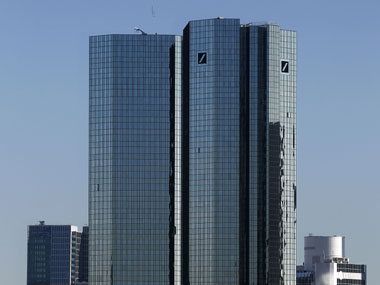After Standard Chartered Bank and HSBC, government agencies in the US are investigating dealings of Deutsche Bank and many other global banks over accusations of funnelling billions of dollars through their branches in New York for sanctioned nations like Iran and Sudan, t_he New York Times_ reported today.
The probe is still in its very early stages, law enforcement officials told the Times, adding that Deutsche Bank was not believed to have moved funds on behalf of Iranian clients through its US operations after 2008.
The investigation of Deutsche Bank is among a series of cases against global financial firms since 2009 suggesting that financial firms often transferred money for Iranian banks and companies under a loophole in US policy that ended in 2008, the Times noted.
[caption id=“attachment_422245” align=“alignleft” width=“380”]  Reuters[/caption]
Earlier this week, global banking giant Standard Chartered agreed to pay $340 million to New York’s top banking regulator, settling allegations that it hid thousands of transactions worth billions of dollars with the Iranian government.
Under the settlement reached with the Department of Financial Services, Standard Chartered will pay a “civil penalty” of $340 million and would have a monitoring system for a term of at least two years.
Once the federal regulators resolve their own concerns with Standard Chartered, they will proceed against the four European banks they have been investigating, including Deutsche Bank.
Impact Shorts
More ShortsThe settlement came after StanChart was accused by the New York regulator of hiding about 60,000 secret transactions with the Iranian government, involving a whopping $250 billion, and exposing the US financial system to terrorists, weapon dealers and drug kingpins.
The report suggests the practice of transferring money on behalf of Iranian banks and corporations flourished under a loophole in the United States policy that ended in 2008.
A spokesman for the German Bank said it had decided in 2007 to “not engage in new business with counter-parties in countries such as Iran, Syria, Sudan and North Korea and to exit existing business to the extent legally possible”.
According to law enforcement officials, the investigation into Indian-origin Anshuman Jain-led Deutsche Bank is still in its very early stages, the daily said.
“So far, there is no suspicion that the bank moved money on behalf of Iranian clients through its American operations after 2008,” the officials said in the report.
However, the recent clash between New York’s top banking regulator and federal authorities over a similar case against Standard Chartered could complicate the investigations, it said.
“The United States prosecutors worry that the $340 million settlement between the New York regulator (New York Superintendent of Financial Services), Benjamin M Lawsky, and Standard Chartered sends a message to international banks and regulators that American authorities are uncoordinated and torn by divisions - since Lawsky acted alone in leveling the charges and settling the case,” the report said.
Prosecutors also worry that foreign banks and regulators would no longer easily cooperate in handing over key transaction data that reveal the parties behind the global movement of tainted money, according to the federal and state prosecutors, it added.
Since 2009, the Justice Department, the Treasury Department and the Manhattan district attorney’s office have brought charges against five foreign banks, saying they moved billions of dollars through their American subsidiaries on behalf of Iran, Cuba and North Korea, nations described as sponsors of terrorism and drug cartels, the report said.
The cases against the five banks included deferred prosecution agreements and required the banks - ABN Amro, Barclays, Credit Suisse, Lloyds and most recently ING - to forfeit a substantial amount of assets, it added.
Until 2008, foreign banks were allowed to transfer money for Iran through their American subsidiaries to a separate offshore institution while providing every detailed information about the client to their United States units.
The banks were required to thoroughly check the transactions for any suspicious activity, it said.
Agencies


)

)
)
)
)
)
)
)
)



